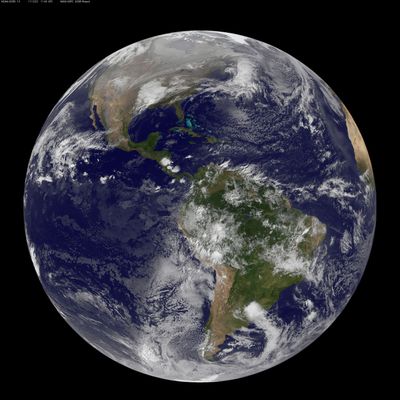Ask Dr. Universe: Why does the sky turn darker in winter?

Washington State University
Dr. Universe: Why does the sky turn darker in winter? – Alex, 6, Cincinnati
Dear Alex,
As winter gets underway here in North America, you may notice we don’t feel the sun’s rays for quite as many hours as we did in fall and summer.
To find out why this happens, I talked with my friend Vivienne Baldassare, an astronomer at Washington State University.
She said the reason we get fewer hours of daylight in the winter has to do with how Earth rotates. As our planet goes around the sun, it is always rotating. This rotation is also why we have day and night.
When the part of Earth you’re standing on faces the sun, it is daytime. When the part you’re standing on faces away from the sun, it is night.
But the reason the length of daylight changes throughout the year is because our planet is a little bit tilted.
“Earth isn’t perfectly straight up and down,” Baldassare said. “It’s a bit tilted on its axis, more like a spinning top.”
The top half of the planet, which is known as the Northern Hemisphere, is tilted more toward the sun when it is summertime. But when it’s wintertime, that means Earth’s Northern Hemisphere is tilted away from the sun. This can make the days feel shorter, and the shortest day of the year is just around the corner.
In the Spokane, we will have 8 hours, 25 minutes of daylight on Tuesday. This is the day we mark as the winter solstice when the Earth’s northern pole reaches its maximum tilt away from the sun. You may also know it as the first day of winter.
After the winter solstice, the days will start to get longer again in most places. But there are some places on our planet, like Tromsø, Norway, that will be completely dark for a few months.
“The farther north you go, the earlier it gets darker in the winter. If you are all the way at the top of the world in the wintertime, you never feel the sun. It’s always dark,” Baldassare said.
When it comes time for the summer solstice in June, Spokane will have just a few seconds shy of 16 hours of daylight.
Earth’s tilt is the reason why it gets dark so early in wintertime and the reason we have different seasons. But I was curious why there’s a tilt at all.
“We think the reason for the tilt is that when our solar system was still forming, and things were pretty chaotic, something collided with the Earth to knock it off its perfect up and down axis to make it a little tilted,” she said.
If you find yourself indoors for most of the winter season, you might try a new game, cozy up with a book, listen to your favorite music, do some stretches or keep a big list of all your science questions.
What kinds of activities do and your family like to do on winter days? Talk about it with your family or friends. Then, share your answer and ideas in an email to Dr.Universe@wsu.edu. We might just feature your answers at askdruniverse.wsu.edu.
Sincerely,
Dr. Universe
Ask Dr. Universe is a project of Washington State University.